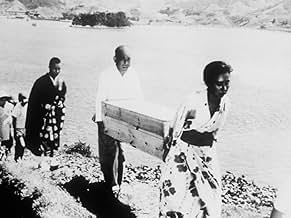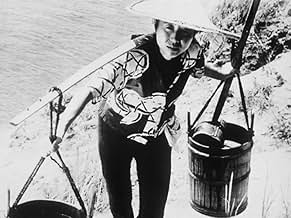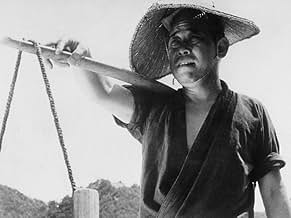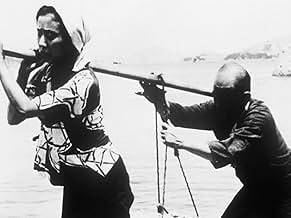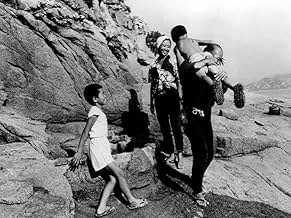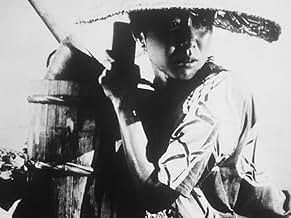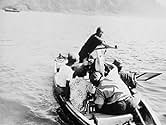IMDb RATING
8.0/10
6.6K
YOUR RATING
A family of four are the sole inhabitants of a small island where they struggle each day to irrigate their crops.A family of four are the sole inhabitants of a small island where they struggle each day to irrigate their crops.A family of four are the sole inhabitants of a small island where they struggle each day to irrigate their crops.
- Nominated for 1 BAFTA Award
- 5 wins & 1 nomination total
- Director
- Writer
- All cast & crew
- Production, box office & more at IMDbPro
Featured reviews
10billr-3
I remember this film from my student days. I saw it in an uptown, shabby, art house theatre (when art meant porn) in Philadelphia. I was amazed. As I recall, it is a film without dialog. Not silent, but no dialog. Black and white, but singularly visual. Three, maybe four characters with self- effacing directing and camera work, it was as intimate as small off-Broadway theatre. I've seen nothing since as cinematic, or moving. No one I've ever met, has seen it. But I remember it vividly.
Amazing! Let me join the happy few who saw this film when it first came out. It was in Paris. I was a student. It was L'Ile Nu I think. And I have never forgotten it and never seen it again. That's over 40 years ago! And now it is coming out on DVD and most people will never have heard of it. So my dear golden oldies who were young in 1961, rejoice and tell everyone. This is pure cinema with no frills, worthy of comparison with Dreyer, Bresson and O'Flaherty and a lovely companion piece to Shindo's ONIBABA. That onibaba grass stayed with us over the years as did that naked island. Talking of films lost but not forgotten, I can draw a comparison with MERE JEANNE DES ANGES (same subject matter as Ken Russell's THE DEVILS)which I saw in Leipzig in about 1962 and which I have never seen since. What a coincidence! That Polish film (MOTHER JOAN OF THE ANGELS)is also coming out on DVD. Real poetic cinema is trickling through the mishmash.
10sansay
I saw this movie twenty years ago and I still remember it fondly. It should be part of the training of movie directors to see and analyze this movie. The naked island (as it was named in France) shows the hard struggle of a fisherman's family to survive in a very harsh environment. It is very emotional yet does not call on any modern artifice to carry the message. The music will stay with you forever. My only regret is that I can't get a copy to show my children what movie making can be.
On a tiny island in the Seto Inland Sea, a small family consisting of husband, wife, and two sons, struggle to get by. They are the island's sole inhabitants, and spend their days fetching water from the mainland and carrying up the steep hill in order to water their crops. One day when the mother and father are away from the island, one of the sons falls ill, and the father races to get help. Their lives are all portrayed in painstaking detail, and the film contains no dialogue whatsoever. The film is directed by Kaneto Shindo, who directed the two brilliant Japanese New Wave horror films, Kuraneko and Onibaba, the only two other films of his I've seen.
This is a break in style and subject for Shindo. The two aforementioned horror films were similarly slow and detailed, but The Naked Island contains no action or atmosphere, but certainly shares their beauty. This is a film that shows how far humanity can be pushed in order to merely get by. The climax of the film (and I don't feel I'm ruining anything by revealing it, the story is not important) has their ill son dying, as his father and the doctor arrive too late. After the funeral, they are forced back to work. The mother, needing to grieve, throws down the water and screams into the ground, as the father watches helpless. Afterwards, she gets up, and methodically resumes watering.
Shindo tackles a universal subject with the neglect of the working class. Filmed with no dialogue, it emphasises their facial expressions and body movements in a way the silent era did, and forces the audience to live through the work they do, every step at a time. The director said he wanted to "capture the life of human beings struggling like ants against the forces of nature," and he certainly does that. The film is slow, and focuses a lot of time on the struggle of carrying the water up the hillside. Yet it's filmed with such elegance, it only hammers their struggle home. This is a beautiful and moving film, that is almost brutal in its relentlessness.
www.the-wrath-of-blog.blogspot.com
This is a break in style and subject for Shindo. The two aforementioned horror films were similarly slow and detailed, but The Naked Island contains no action or atmosphere, but certainly shares their beauty. This is a film that shows how far humanity can be pushed in order to merely get by. The climax of the film (and I don't feel I'm ruining anything by revealing it, the story is not important) has their ill son dying, as his father and the doctor arrive too late. After the funeral, they are forced back to work. The mother, needing to grieve, throws down the water and screams into the ground, as the father watches helpless. Afterwards, she gets up, and methodically resumes watering.
Shindo tackles a universal subject with the neglect of the working class. Filmed with no dialogue, it emphasises their facial expressions and body movements in a way the silent era did, and forces the audience to live through the work they do, every step at a time. The director said he wanted to "capture the life of human beings struggling like ants against the forces of nature," and he certainly does that. The film is slow, and focuses a lot of time on the struggle of carrying the water up the hillside. Yet it's filmed with such elegance, it only hammers their struggle home. This is a beautiful and moving film, that is almost brutal in its relentlessness.
www.the-wrath-of-blog.blogspot.com
10ewc
If you have ever wondered what a film would be like that exemplifies how the tools of the craft can be used to do powerfully what no other art can do, this film answers the question. It is among the most carefully wrought, least encumbered yet profound movies ever made. The fact that it has long been unavailable in America and Europe in any accessible format reflects very sadly upon us all. (Addendum 15 March 2008 for those of you with region-free players: the English distributor, Eureka, has thankfully released the original widescreen version of the movie in PAL format in its 'The Masters of Cinema Series', #12, with an optional commentary by Shindo and his composer, Hikaru Hayashi. Available from Amazon.uk.)
Did you know
- Trivia'Hadaka no shima' was made, in the words of its director, "as a 'cinematic poem' to try and capture the life of human beings struggling like ants against the forces of nature."
- ConnectionsReferenced in Century of Cinema: Un siècle de cinéma japonais, par Nagisa Oshima (1995)
- How long is The Naked Island?Powered by Alexa
Details
- Release date
- Country of origin
- Language
- Also known as
- The Naked Island
- Filming locations
- Production companies
- See more company credits at IMDbPro
Box office
- Gross worldwide
- $14,673
- Runtime
- 1h 36m(96 min)
- Color
- Sound mix
- Aspect ratio
- 2.35 : 1
Contribute to this page
Suggest an edit or add missing content



